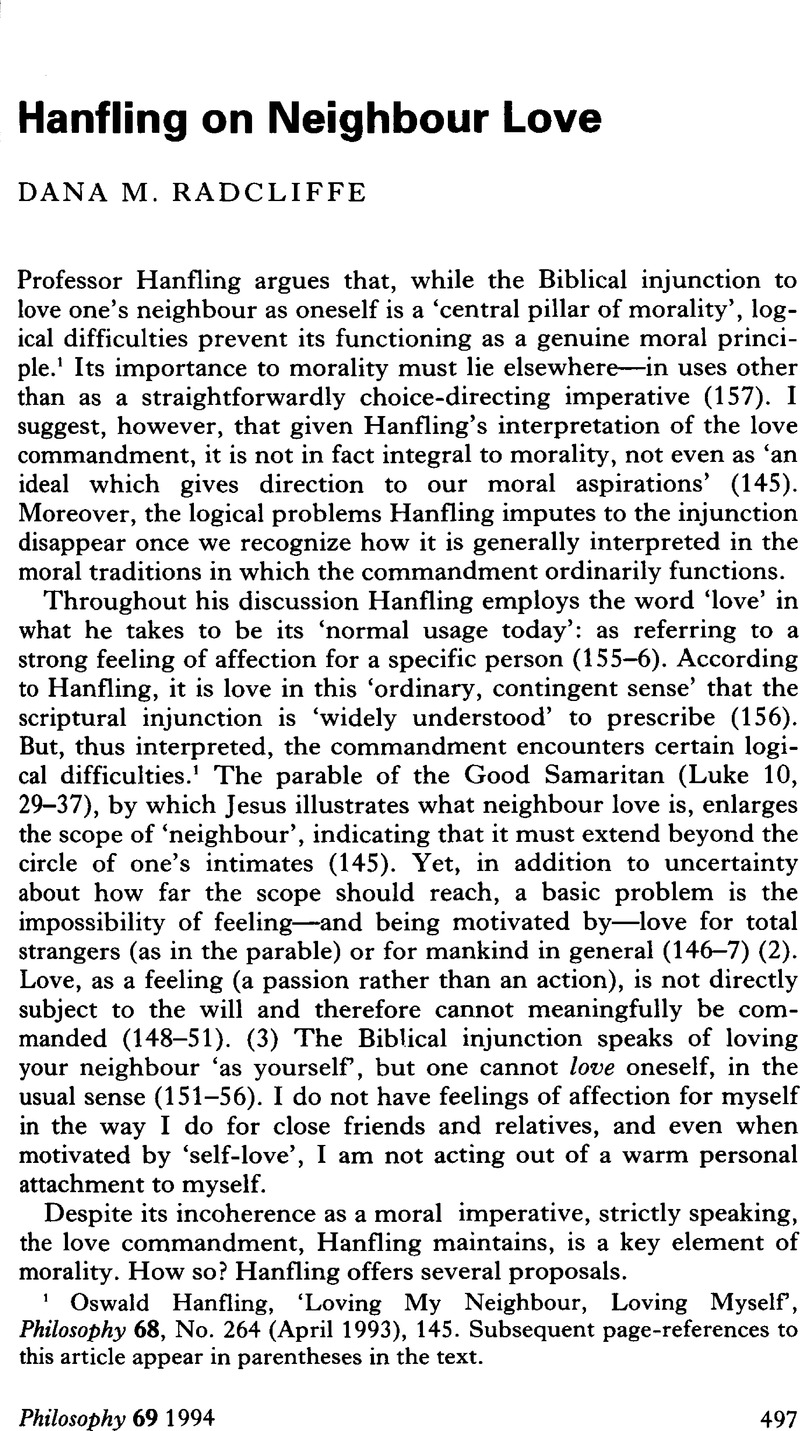No CrossRef data available.
Article contents
Hanfling on Neighbour Love
Published online by Cambridge University Press: 30 January 2009
Abstract

- Type
- Discussion
- Information
- Copyright
- Copyright © The Royal Institute of Philosophy 1994
References
1 Oswald, Hanfling, ‘Loving My Neighbour, Loving Myself, Philosophy 68, No. 264 (April 1993), 145. Subsequent page-references to this article appear in parentheses in the text.Google Scholar
2 See, e.g.,Bloch, Abraham P., A Book of Jewish Ethical Concepts: Biblical and Postbiblical (New York: Kvat, 1984), 197–98;Google ScholarReines, Chaim W., ‘The Self and the Other in Rabbinic Ethics’, Contemporary Jewish Ethics, Kellner, Menachem Marc (ed.) (New York: Sanhedrin Press, 1978), 163;Google ScholarShubert, Spero, Morality, Halakha and the Jewish Tradition (New York: Kvat, 1983), 203, 360 (n. 3).Google Scholar
3 Gene, Outka, Agape: An Ethical Analysts (New Haven: Yale University Press, 1972), 9.Google Scholar
4 Rudolf, Bultmann, Jesus and the Word, Louise Pettibone and Erminie Huntress Lantero (tr.) (New York: Scribner′s, 1958), 117.Google Scholar
5 Reinhold, Niebuhr, An Interpretation of Christian Ethics (San Francisco: Harper & Row, 1963), 30.Google Scholar
6 Furnish, Victor Paul, The Love Command in the New Testament (Nashville: Abingdon, 1972), 195.Google Scholar
7 Immanuel, Kant, Foundations of the Metaphysics of Morals, Lewis White Beck (tr.) (Indianapolis: Bobbs-Merrill, 1959), 14–17Google Scholar. See also Kant, , The Metaphysical Principles of Virtue, James Ellington (tr.) (Indianapolis: Bobbs-Merrill, 1964), 121.Google Scholar
8 Op. cit., note 7, Foundations, 15–16Google Scholar
9 Maclagan, W. G., ‘Respect for Persons as a Moral Principle-I‘, Philosophy 35, No. 134 (July 1960), 193–217CrossRefGoogle Scholar, and ‘Respect for Persons as a Moral Principle-II’, Philosophy 35, No. 135 (October 1960), 289–305.Google Scholar
10 Ibid., 289.
11 In ‘Compassion and Commanded Love’, Faith and Philosophy II No. 1 (January, 1994), I argue that the emotion of compassion is a kind of concern-based construal of a person in distress, where such a construal is, to some extent, subject to one′s will and therefore a possible object of an s imperative. Thus, while agape is not itself an emotion, obedience to the 0 love commandment might sometimes entail intentionally bringing about, ) by appropriately exercising one′s powers of attention and imagination, a feeling of compassion for another which motivates one to come to his aid.


